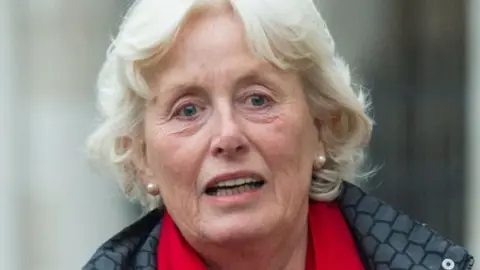Divorce: New law could lead to 'spike' - minister
 PA
PAA new law could lead to a 'spike' in divorces, but the rate is ultimately like to "remain much the same", the justice secretary has said.
David Gauke said people were holding off until the law changed leading to an increase "in the waiting list".
He said it was vital the reforms were made to end the divorce "blame game".
The Divorce, Dissolution and Separation Bill removes the need, in England and Wales, to find fault in order to start proceedings immediately.
MPs approved the bill at its second reading - bringing changes a step closer to becoming reality. In order to become law it will undergo further scrutiny from MPs before being considered by peers in the House of Lords.
During the debate, Mr Gauke told the Commons current rules prevent couples from separating "if they have grown apart" unless they have the means to live apart for two years.
He also said a change in the law would help in situations where there is one abusive partner, but the other does not want to raise these issues in court.
Shadow justice secretary Richard Burgon said Labour supported the bill, arguing it would protect women from domestic abuse, limit the damage to children and "encourage amicable separations".
But he also urged the government to reintroduce legal aid for early legal advice for couples going through the divorce procedure.

Current grounds for divorce in England and Wales:
When you apply for a divorce you must prove your marriage has broken down and give one of the following five reasons:
- Adultery
- Unreasonable behaviour
- Desertion
- You have lived apart for more than two years and both agree to the divorce
- You have lived apart for at least five years, even if your husband or wife disagrees
Source: Gov.UK
What does the new bill do?
- Replaces the requirement to provide evidence of conduct or separation facts with a new requirement to provide a statement of irretrievable breakdown
- Introduces a new option of a joint application
- Removes the possibility of contesting the decision to divorce, as the statement of irretrievable breakdown would be taken as conclusive evidence that the marriage has broken down irretrievably
- Introduces a minimum overall timeframe of six months into the divorce process
- Updates the terminology
Source: Parliament.uk

Other MPs were less supportive of the bill, emphasising their belief in the importance of couples staying together.
Conservative Fiona Bruce said there was evidence that "even in argumentative" relationships, the stability of marriage benefitted any children.
She suggested the proposals would promote "divorce on demand" and could "inhibit the dialogue that could promote reconciliation".
DUP MP Gavin Newlands disagreed with her, though, asking "why should someone feel trapped in a marriage in which they are not invested?"
Lib Dem Wera Hobhouse said the law was "a positive step" which would "empower people, not hold them back".
However, she said the legal system still needed to "catch up". She said "millions of couples live together without making a formal commitment", and urged the government to introduce "essential rights" for those who had cohabited for at least three years.
Spike in divorces?
Another Tory MP - Eddie Hughes - told MPs he thought his marriage "would be forever but my wife decided otherwise".
"It was a very emotional time," he said.
He raised concerns that the new rules could make it easier to divorce and there would be "a spike" in the number of couples separating.
On the possibility of a spike in rates, Mr Gauke said a rise was inevitable because people have been holding off their separation, waiting for the laws to be changed.
"So, the likelihood is there will be an increase because of that waiting list," he said.
He added international evidence indicated "once that initial spike has been dealt with... the divorce rate is unlikely to increase and it is likely to remain much the same."
The proposed changes follow the Supreme Court's rejection of a woman's appeal for divorce after her husband refused to agree a split.
Tini Owens, 68, from Worcestershire, wanted to divorce her husband of 40 years, on the grounds that she was unhappy.
But husband Hugh refused to agree to it and the Supreme Court unanimously rejected her appeal.
It meant the couple must remain married until 2020.
